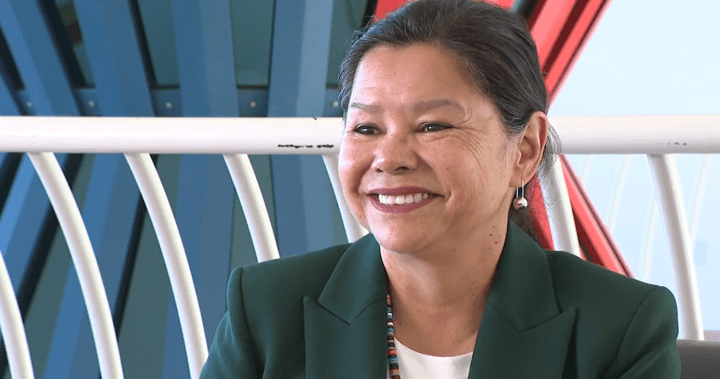Jacqueline Ottmann, also known as Misiaykimigookpaypomwayotung, grew up on Fishing Lake First Nation under the strong leadership of her parents. Her father, Allan Paquachan, served as chief of the community for 30 years, while her mother, Marjorie Paquachan, worked as a school bus driver for nearly 50 years. Growing up, Ottmann was exposed to both political and general leadership responsibilities, which influenced her decision to focus her graduate research on leadership and organizational development. She was motivated by the lack of literature on leadership from Indigenous perspectives, as well as her experiences working as a teacher and principal before transitioning to academic leadership roles at the University of Calgary and the University of Saskatchewan.
Ottmann’s career trajectory eventually led her to become the president of the First Nations University of Canada in 2021. Throughout her career, she has been recognized for her advocacy for social justice and her commitment to creating positive change. Ottmann views educational leadership as a potential solution to many issues affecting Indigenous and non-Indigenous communities. She emphasizes the importance of using one’s voice to make an impact and encourages aspiring leaders to take action each day in pursuit of meaningful change. Ottmann’s leadership journey has been guided by the examples set by her parents and grandparents, who instilled in her the value of making a difference through consistent effort and dedication.
As an academic and advocate, Ottmann has worked tirelessly to promote Indigenous perspectives and advance social justice causes. She has been instrumental in bridging the gap between Indigenous and non-Indigenous communities through her research and leadership roles. Ottmann’s unique background and experiences have shaped her approach to leadership, focusing on collaboration, inclusivity, and the empowerment of individuals from diverse backgrounds. Her commitment to creating positive change extends beyond her professional responsibilities and into her personal beliefs, embodying the values of respect, integrity, and empathy in all aspects of her life.
Throughout her career, Ottmann has strived to be a role model for future leaders, emphasizing the importance of authenticity, compassion, and perseverance. She believes that by embodying these qualities and staying true to one’s values, individuals can make a lasting impact on their communities and society as a whole. Ottmann’s leadership philosophy is rooted in the belief that every individual has the potential to effect change, regardless of their background or circumstances. She encourages others to follow their passions, pursue their goals, and use their voices to advocate for meaningful causes, inspiring others to join in the collective effort to build a more inclusive and equitable society.
In her role as the president of the First Nations University of Canada, Ottmann has continued to advocate for Indigenous perspectives and elevate the voices of Indigenous communities. She has been a guiding force in shaping the institution’s strategic direction and fostering a culture of inclusivity and diversity. Ottmann’s leadership style is characterized by her collaborative approach, open communication, and commitment to empowering others. She believes that by working together and embracing differences, individuals can achieve greater impact and create positive change in their communities. Ottmann’s dedication to advancing Indigenous education and social justice issues has made her a respected and influential leader within both academic and Indigenous communities.
As she continues her journey as a leader and advocate for social justice, Ottmann remains grounded in her values and driven by her passion to create a more equitable and inclusive society. Her experiences growing up on Fishing Lake First Nation and witnessing the leadership of her parents have shaped her perspective and approach to leadership. Through her work, Ottmann strives to inspire others to embrace their unique identity, voice, and experiences as sources of strength and resilience. She believes that by standing together and supporting one another, individuals can overcome challenges, create meaningful change, and build a more just and compassionate world for future generations.


